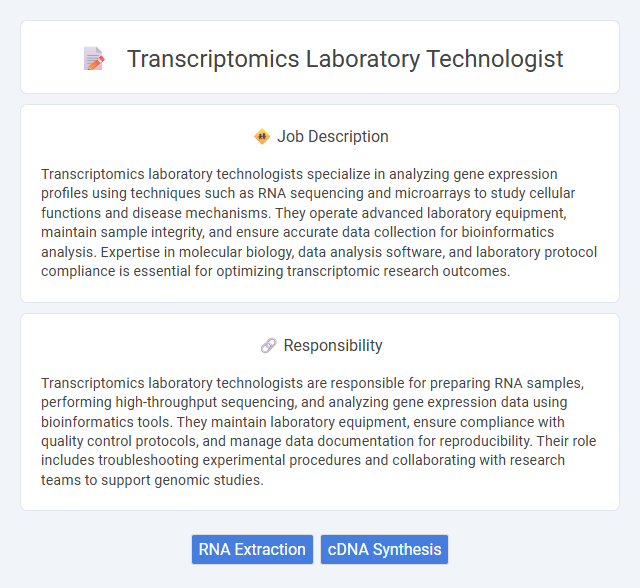
Transcriptomics laboratory technologists specialize in analyzing gene expression profiles using techniques such as RNA sequencing and microarrays to study cellular functions and disease mechanisms. They operate advanced laboratory equipment, maintain sample integrity, and ensure accurate data collection for bioinformatics analysis. Expertise in molecular biology, data analysis software, and laboratory protocol compliance is essential for optimizing transcriptomic research outcomes.
Individuals with strong analytical skills and attention to detail are likely suitable for a Transcriptomics Laboratory Technologist role, as the job often requires precise handling of complex genetic data and conducting experiments under controlled conditions. Those who can maintain focus in a fast-paced, research-driven environment and have a background in molecular biology or bioinformatics may adapt well to the demands of this job. However, people who struggle with repetitive tasks or have difficulty interpreting large datasets might find the role challenging.
Qualification
A Transcriptomics Laboratory Technologist typically requires a bachelor's degree in molecular biology, genetics, biotechnology, or a related field, with practical experience in RNA sequencing and microarray technologies. Proficiency in laboratory techniques such as RNA extraction, cDNA synthesis, and bioinformatics tools for data analysis is essential. Strong understanding of quality control standards and laboratory safety protocols enhances the candidate's ability to contribute effectively to transcriptomic research projects.
Responsibility
Transcriptomics laboratory technologists are responsible for preparing RNA samples, performing high-throughput sequencing, and analyzing gene expression data using bioinformatics tools. They maintain laboratory equipment, ensure compliance with quality control protocols, and manage data documentation for reproducibility. Their role includes troubleshooting experimental procedures and collaborating with research teams to support genomic studies.
Benefit
Working as a Transcriptomics Laboratory Technologist likely offers exposure to cutting-edge genomic technologies that enhance skills in RNA analysis and data interpretation. Employees may benefit from opportunities to contribute to groundbreaking research in gene expression, potentially leading to career advancement and specialization. The role probably provides a structured laboratory environment with access to advanced equipment, fostering professional growth and expertise in molecular biology.
Challenge
Working as a Transcriptomics laboratory technologist likely involves navigating complex data analysis and ensuring accuracy in high-throughput sequencing processes. The challenge may also stem from maintaining cutting-edge knowledge of evolving transcriptomic techniques and managing large volumes of biologically diverse samples. This role probably demands precision, adaptability, and problem-solving skills to interpret gene expression patterns effectively.
Career Advancement
Transcriptomics laboratory technologists play a crucial role in analyzing RNA sequences to understand gene expression patterns, which advances personalized medicine and biotechnology. Career advancement opportunities in this field include progressing to senior technologist, research scientist, or bioinformatics specialist, often requiring expertise in next-generation sequencing and data analysis. Gaining proficiency in emerging transcriptomic technologies and bioinformatic tools significantly enhances potential for leadership roles and collaborative research projects.
Key Terms
RNA Extraction
A Transcriptomics Laboratory Technologist specializes in RNA extraction techniques to isolate high-quality RNA from various biological samples, ensuring accuracy for downstream applications such as sequencing and gene expression analysis. Proficiency in handling fresh, frozen, or formalin-fixed samples and using advanced equipment like automated extraction systems is essential for reliable and reproducible results. Expertise in quality control measures, including RNA quantification and purity assessment, is critical to support comprehensive transcriptomic studies.
cDNA Synthesis
A Transcriptomics laboratory technologist specializing in cDNA synthesis expertly isolates RNA and converts it into complementary DNA using reverse transcriptase enzymes, ensuring high-quality templates for downstream applications like qPCR and next-generation sequencing. Proficiency in optimizing reaction conditions and validating cDNA integrity is crucial for accurate gene expression analysis and transcriptome profiling. Strong skills in RNA handling, contamination prevention, and data documentation enhance the reliability of transcriptomic research outcomes.
 kuljobs.com
kuljobs.com